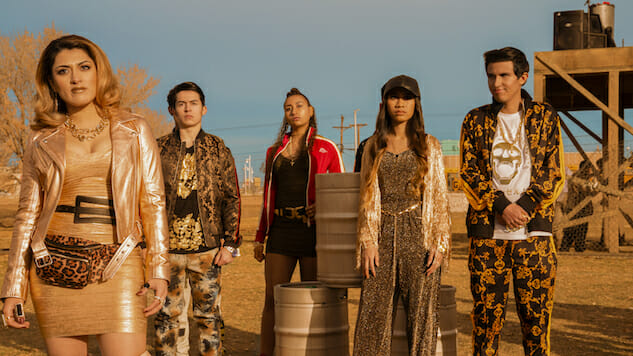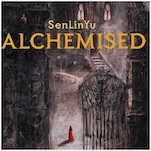Netflix’s Post-Apocalyptic Teen Comedy Daybreak Throws Every Trope It Can Find Against the Wall, and We Don’t Hate It
For the trope-obsessed post-apocalyptic teen comedy, it’s not the end of the world that matters, it’s how they live (and party) through it.

Watching Netflix’s new teen post-apocalypse comedy Daybreak, which stars Supernatural’s Colin Ford as a C-student skating his way through a post-apocalyptic, zombie-infested Glendale, CA, is like shrugging on a colored-glass suit of ronin samurai armor that someone—possibly Ferris Bueller himself the most basic of teen movie magic to fashion, from the kaleidoscope of Twain’s old saw, that there’s no such thing as a new idea, just new ways of putting the same old shiny pieces together.
— A sardonic, aggressively average white teen lead (Ford) who constantly breaks the fourth wall to get real with the viewer about what his life is like? Check.
— Cool-as-shit gay black jock (Austin Crute) who makes a surprising* decision to team up with the fourth-wall-breaking lead? Check.
— Foul-mouthed, pyromaniac, punk-chic ten-year-old girl genius (Alyvia Alyn Lind)? Check.
— A bio-bomb that wipes out and/or zombifies everyone over the age of eighteen? Check.
— Post-apocalypse tribes made up of zealously self-interested high school cliques (but make it FASHION)? Check.
— An MIA blonde girlfriend (Sophie Simnett) the fourth-wall-breaking lead has made it his lone post-apocalyptic mission to find and rescue? Check.
— Rogue, masked, motorcycle-riding cannibal? Check.
— Samurai-themed redemption arc? Check. A forbidden Romeo/Juliet love? Check.
— A knockoff Cardashyan (Gergory Casyan)? Check.
— Mutant squirrels? Check.
— So-crazy-she’s-wise zombie teacher witch (Krysta Rodriguez)? Check.
— An entire population of teen boys who have to stop everything to snigger anytime someone says the word bone? Check.
— A ‘fuck the Apocalypse, let’s dance!’ narrative break? Check.
— A soundtrack that jerks from The Mountain Goats to “Teenage Wasteland” to an alt-rock cover of “I Melt With You,” the Modern English teen classic? Check.
— Basically the exact premise of The Last Kids on Earth, which Netflix itself adapted literally last month, just turned live-action and aged up? Check!
Bueller?… Bueller?… Bueller…???
Look: If what you want out of your next teen/Apocalypse binge are new ideas, Daybreak isn’t going to do the trick. Josh Wheeler (Ford) isn’t a surprising choice for reluctant teen hero. Sam (Simnett) is not a surprising choice for damsel in (possible) distress. Ex-jock Wesley Fists (Crute) and Anjelica the preteen nightmare (Lind) aren’t surprising choices for ragtag heroic sidekicks. (See again: Last month’s The Last Kids on Earth adaptation.) Bloodthirsty jock vikings, homesteading 4-Hers, viciously misandrist Cheermazons and an über-woke principal this close to completely cracking: none are clever Apocalyptic takes on classic high school chestnuts.
That said, for all that Daybreak wears its dozens upon dozens of teen/genre movie tropes on its Mad Max: Fury Road sleeves, it’s still super watchable. More than that, once the first episode (“Josh vs. the Apocalypse, Pt. 1”) dispenses with both the most necessary pre- and post-apocalyptic exposition and the most blatant John Hughes clichés—yes, Josh’s biology teacher does drone “Wheeler?… Wheeler?… Wheeler???” as he turns to break through the wall while she’s calling attendance; no, thank YOU for asking—it does what any self-aware kaleidoscope of old ideas should do and uses its gross of references to subvert some key expectations in compelling ways.
Some of this subversion happens on the character level—though still relegated to Josh’s regret-fueled memories by the end of the fifth episode (the last provided for review), Sam, for example, isn’t the same old object of mystery/lust her character might have been relegated to in post-apocalyptic stories of yore, but rather a three-dimensional person with whom both Josh and everyone else at Glendale High had real relationships. And, who Post-It evidence shows was, at least at some point, searching post-boom Glendale for Josh, too. But the most interesting upending of expectations is in its form. Specifically, in how the characters break the fourth wall, and how the show uses those breaks to give dimension to arcs and meta-jokes that might otherwise fall flat. This subversion starts in the cold open of the second episode (self-referentially titled “Schmuck Bait!”), during which the fourth wall camera that Josh has been addressing, Bueller-style since the Apocalypse began, suddenly refuses to play along, forcing him to tell his own story in a way he wouldn’t otherwise choose and thus introducing interesting tension in the last place you’d expect. Josh’s control over the fourth wall narrative disintegrates even further in the third episode (“The Slime Queenpin of Glendale, CA”) when Josh passes out from infection, leaving Angelica and her formative love of mafia movies to seize control via voiceover. This voiceover framing continues in the fourth episode (“MMMMMMM-HMMMMMM”), which sees Principal Burr (Matthew Broderick) splitting the duty with Angelica. The fifth episode (“Homecoming Redux or My So Called Stunt Double Life,” written by the Internet’s own Ira Madison III), which dives into Wesley Fists’ emotionally fraught backstory, is also framed by a voiceover. But it’s not by Angelica or Burr, or even by Wesley, himself—no, Wesley’s ronin-themed story is narrated by RZA. Like, really RZA. Naturally!
On their own, none of these choices would be enough to rocket Daybreak from goofy, reference-fueled diversion to apocalyptic teen comedy gold, but taken together, they demonstrate a high degree of un-self-seriousness and a keen sense of how to reinforce a tired narrative that does elevate the show beyond simple bloody silliness. What Daybreak will do with those tools to twist Wesley’s kaleidoscopic ronin armor into a pattern worth remembering, who knows? Although honestly, to paraphrase a hooky-playing scholar, at this point it should be clear that the question we should be asking isn’t “what is Daybreak going to do by the end of its first season?” The question is what isn’t is going to do? Everyone else’s mileage may vary, but for my part, I, at least, will keep watching to find out.
Daybreak is now streaming on Netflix.
Alexis Gunderson is a TV critic and audiobibliophile. She can be found @AlexisKG.







































